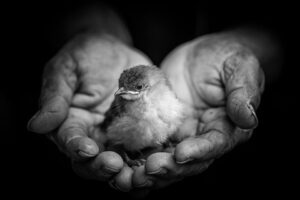A good story can open the doors to the mind and the heart.

Thirty years ago, Toni Morrison was awarded the Nobel Prize for Literature and delivered her acceptance speech in the form of a narrative to the Swedish Academy in Stockholm. She welcomed the world into her version of a “once upon a time” encounter between an old woman she described as blind, wise, black, and the daughter of slaves with a group of young people who paid the woman a visit.
The children ask a question. “Old woman, I hold in my hand a bird. Tell me whether it is living or dead.”

After a set of prolonged silences, the woman finally speaks: “I don’t know,” she says. “I don’t know whether the bird you are holding is dead or alive, but what I do know is that it is in your hands.”
Both entities rebuke each other.
The old woman disdains the children’s mockery of her blindness and she reprimands them for asking a question she knows requires physical sight to answer. She rebukes them for sacrificing the “small bundle of life” they hold in their hands. In her eyes, the group “seems bent on disproving her clairvoyance and showing her up for the fraud they believe she is.”
But then the speaker Toni Morrison suggests to her listeners that perhaps the bird signifies language and the woman in the story is a writer. Is the life-entity we call language then, alive or dead in the young visitors’ hands?
The blind woman in the story beholds the power of language in her thoughts as she muses about the beautiful and terrifying potential of what language can do and has done throughout history. This discourse is a solemn mirror into our past. But at this point in the encounter, the blind woman chooses to remain silent. She withholds speaking to her visitors who stand before her.
* * * *
The young ones rebuke the old woman for her silence, for her lack of words that form the barrier “erected between generosity and wisdom,” for their inheritance of previous generations’ irresponsibility and atrocities. “We have no bird in our hands, living or dead,” they say. “Why didn’t you reach out, touch us with your soft fingers …until you knew who we were?”
They describe being baffled over how to get the wise woman’s attention, thereby concocting the dead-or-alive-bird ruse. They chastise her “old, blank eyes” that see only “cruelty and mediocrity”. They ask, “Is there no context for our lives? No song, no literature, no poem full of vitamins, no history connected to experience that you can pass along to help us start strong?” Tell us, tell us, is their plea, what the world has been to you.
Their questions beg to be noticed, to be accepted, to be engaged by the act of language, the act of conversation. They rebuke the old one for her assumptions about them, her insistence to remain mute, and their yearning to hear wisdom.
* * * *
It is quiet now. No one speaks. But all this changes. . .
The woman clearly articulates a transformation has occurred. “Finally, I trust you now. I trust you with the bird that is not in your hands because you have truly caught it. How lovely it is, this thing we have done—together.”
This thing we have done together—the narrative itself, though crafted in the words, imagination, and heart of author Toni Morrison, is the language of bright possibility and responsibility not only for the characters in her story, but for all people. Morrison’s symphonic wand with words defies gravity. Her eloquent message is as pertinent today as it was thirty years ago. That bird then, resides in the palm of all humanity, every race, creed, gender, age—one to another as we must ensure the vitality and freedom of all language.
To listen to the beautiful content and cadence of Tony Morrison’s Nobel Prize Lecture:
https://www.youtube.com/watch?v=PUJOqSqAfro

Remembering Black History Month, the spiritual beginning of the Christian Season of Lent, and of course, the exchange of paper and real hearts on Valentine’s Day.
Thanks for stopping by.♥
https://www.nobelprize.org/prizes/literature/1993/morrison/lecture/
Toni Morrison (born Chloe Ardelia Wofford, February 18, 1931 – August 5, 2019)

